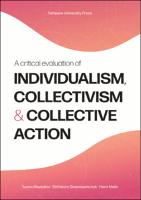A Critical Evaluation of Individualism, Collectivism and Collective Action
Author(s)
Rautakivi, Tuomo
Siriprasertchok, Ritthikorn
Melin, Harri
Language
EnglishAbstract
"This comparative study aims to develop a deeper understanding of collectivism, trade unionism, and the capacity to create collective action using Finland and Cambodia as examples of individualistic and collectivistic societies, respectively.
The study has two goals: 1) To explore the relationship between collective action, and the level and forms of collectivism in Cambodia and in Finland. 2) To explain if and how the level of collectivism affects the degree of cooperation inside the living system. Phenomena such as political participation, family values, levels of trust within the society, and perceived collective efficacy are examined. The study is based on extensive survey data collected in Cambodia and Finland.
The theoretical framework is sociological, involving the study of social systems within which observed regularities emerge and evolve through collaborative and collective behaviour. This approach also entails the personality systems of individual actors and the cultural system built into their actions. The main analytical tool used in the study is the Cultural Agency Theory (CAT).
Significant differences were found in how individuals behave at the societal level. Collective action and political participation occur at a higher level in Finland compared to Cambodia. The results also show that the question of individualism versus collectivism is more complex than is generally believed."


 Download
Download Web Shop
Web Shop